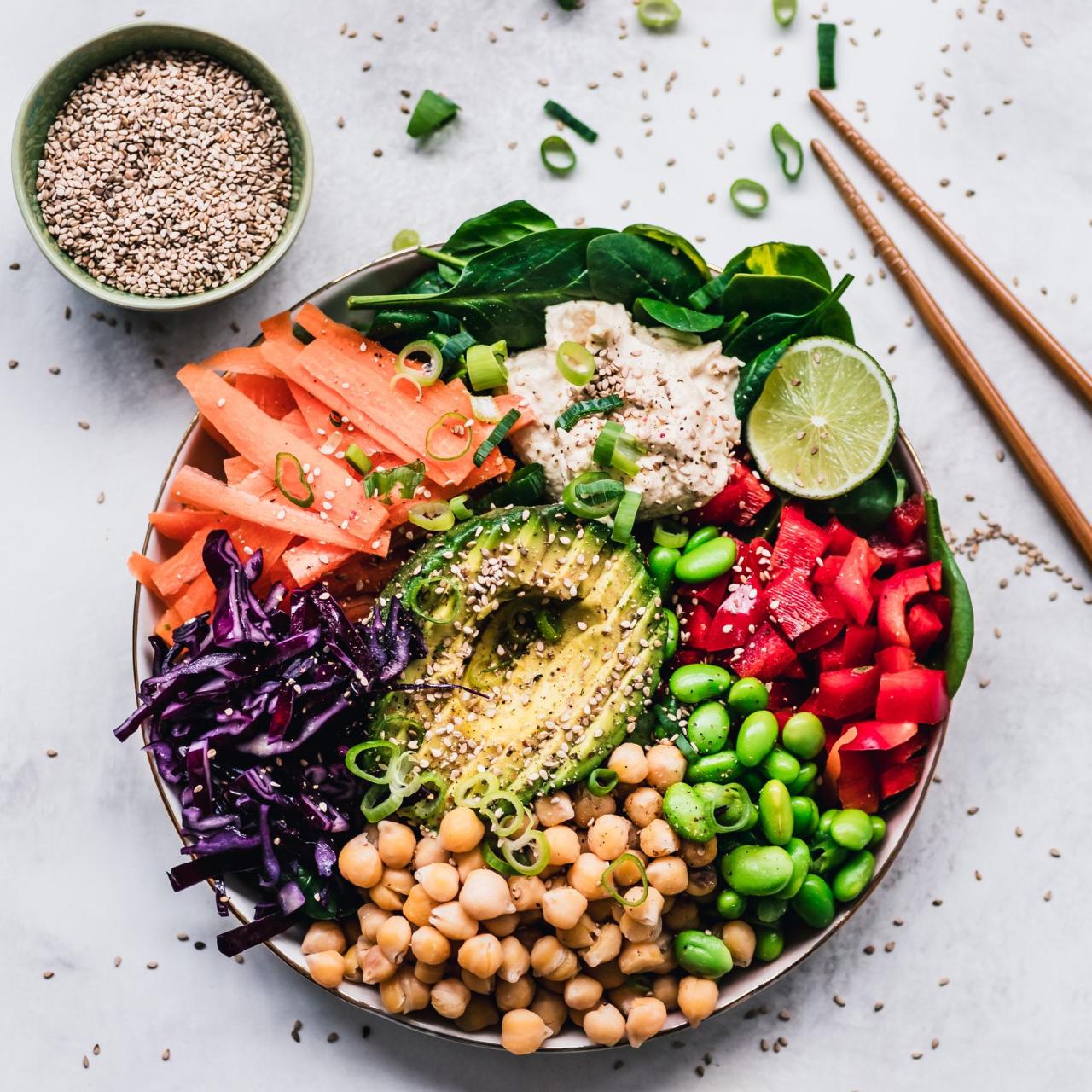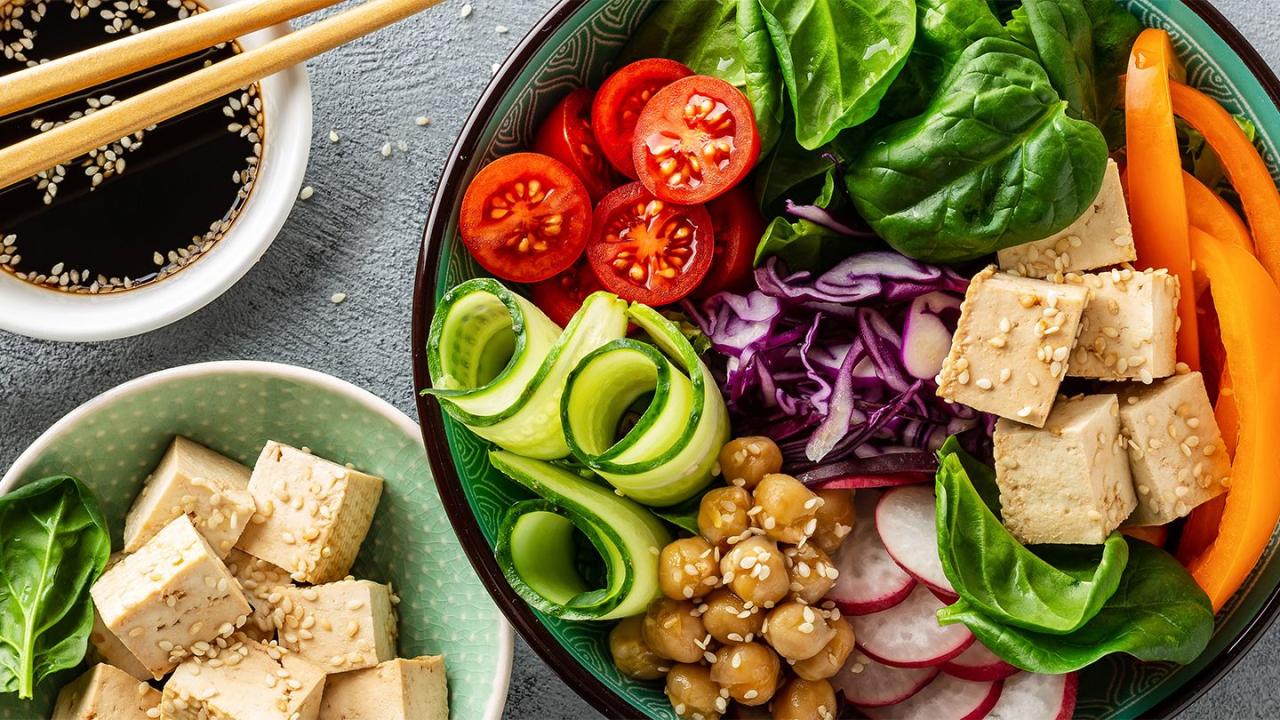What is vegetarian food – Vegetarian food has emerged as a popular dietary choice, offering numerous health and environmental benefits. Embark on a culinary adventure as we explore the world of vegetarianism, uncovering its definition, types, challenges, and an array of plant-based food sources.
From the ethical concerns of animal welfare to the pursuit of a healthier lifestyle, vegetarianism has gained widespread recognition. Join us as we delve into the fascinating realm of plant-based nutrition.
Definition of Vegetarian Food
Vegetarianism is a type of diet that excludes the consumption of meat, poultry, fish, and seafood. It is a plant-based diet that emphasizes the consumption of fruits, vegetables, legumes, nuts, seeds, and whole grains.
There are different types of vegetarian diets, each with its own set of restrictions. Some common types include:
Lacto-vegetarian
- Lacto-vegetarians exclude meat, poultry, fish, and seafood from their diet but consume dairy products such as milk, cheese, and yogurt.
Ovo-vegetarian
- Ovo-vegetarians exclude meat, poultry, fish, seafood, and dairy products from their diet but consume eggs.
Pescatarian
- Pescatarians exclude meat and poultry from their diet but consume fish, seafood, and dairy products.
Benefits of Vegetarianism
Vegetarianism offers numerous health and environmental benefits. Research consistently demonstrates that plant-based diets can significantly reduce the risk of chronic diseases, improve overall well-being, and contribute to a more sustainable planet.
Reduced Risk of Chronic Diseases
Vegetarian diets have been linked to a lower risk of various chronic diseases, including:
- Heart disease:Vegetarian diets are rich in fiber, antioxidants, and phytochemicals, which help lower cholesterol levels, reduce inflammation, and improve blood pressure.
- Cancer:Studies have shown that vegetarians have a lower risk of developing certain types of cancer, such as colon, breast, and prostate cancer. This is attributed to the high intake of fruits, vegetables, and whole grains, which contain protective compounds.
- Type 2 diabetes:Vegetarian diets are typically low in saturated fat and high in fiber, which helps regulate blood sugar levels and reduce the risk of developing type 2 diabetes.
Challenges of Vegetarianism: What Is Vegetarian Food
Embarking on a vegetarian lifestyle offers numerous health benefits, but it also presents certain challenges that need to be addressed. One of the most common concerns is nutrient deficiencies, as vegetarian diets exclude animal products that are rich in specific nutrients.
Nutrient Deficiencies
Vegetarians may be at risk of deficiencies in certain nutrients, including:
- Vitamin B12:Found exclusively in animal products, vitamin B12 is essential for red blood cell formation and nerve function.
- Iron:While plant-based foods contain iron, it is less easily absorbed than heme iron from animal sources.
- Calcium:Dairy products are a major source of calcium, so vegetarians need to ensure they consume calcium-rich plant-based foods.
Embarking on a vegan lifestyle often raises questions about dietary restrictions. While seafood is traditionally associated with animal consumption, some individuals may wonder if vegans eat seafood . This topic has sparked discussions and varying perspectives within the vegan community.
- Omega-3 fatty acids:Fatty fish are the primary source of omega-3 fatty acids, which are important for heart and brain health.
- Protein:Although plant-based foods contain protein, it may not be as complete as animal protein.
Addressing Nutrient Deficiencies
To address these nutrient deficiencies, vegetarians can employ the following strategies:
- Supplementation:Vitamin B12 supplements are recommended for all vegetarians, and iron, calcium, and omega-3 supplements may be necessary for some individuals.
- Dietary Planning:Careful meal planning is essential to ensure adequate intake of essential nutrients. This includes consuming fortified foods, incorporating plant-based sources of iron (e.g.,
As a vegan, you may have heard conflicting information about seafood consumption. While some believe that seafood is a healthy addition to a plant-based diet, others argue that it contradicts the ethical principles of veganism. To clarify this topic, let’s explore the perspectives surrounding vegan eat seafood and delve into the complexities of this dietary choice.
lentils, spinach), calcium (e.g., tofu, fortified plant milks), and omega-3 fatty acids (e.g., flaxseeds, chia seeds).
Vegetarian Food Sources

A vegetarian diet excludes meat, poultry, fish, and seafood. However, it emphasizes plant-based foods, including fruits, vegetables, legumes, nuts, and seeds. These foods provide essential nutrients that are crucial for maintaining a healthy vegetarian lifestyle.
To ensure a balanced vegetarian diet, it’s important to consume a variety of plant-based foods from different food groups. Here’s a comprehensive list of vegetarian food sources organized into categories:
Fruits
- Apples
- Bananas
- Berries (blueberries, raspberries, strawberries)
- Citrus fruits (oranges, grapefruits, lemons)
- Grapes
- Mangoes
- Papayas
- Pineapples
- Watermelons
Vegetables
- Asparagus
- Broccoli
- Brussels sprouts
- Carrots
- Cauliflower
- Celery
- Cucumbers
- Greens (kale, spinach, collard greens)
- Mushrooms
- Onions
- Peppers
- Potatoes
- Sweet potatoes
- Tomatoes
Legumes
- Beans (black beans, kidney beans, pinto beans)
- Chickpeas
- Lentils
- Peas
- Soybeans
- Tofu
- Tempeh
Nuts and Seeds, What is vegetarian food
- Almonds
- Cashews
- Chia seeds
- Flax seeds
- Hemp seeds
- Pecans
- Pumpkin seeds
- Walnuts
Vegetarian Recipes

Vegetarian recipes offer a diverse array of dishes that showcase the versatility and flavor of plant-based ingredients. From hearty stews to refreshing salads, there’s a vegetarian recipe to suit every taste and dietary preference.
The table below provides a glimpse into the wide range of vegetarian recipes available, spanning different cuisines and catering to specific dietary needs:
| Dish | Cuisine | Dietary Preference |
|---|---|---|
| Vegetable Biryani | Indian | Vegan, Gluten-free |
| Falafel Pita Pockets | Middle Eastern | Vegan, Gluten-free |
| Quinoa Salad with Roasted Vegetables | Mediterranean | Vegan, Gluten-free |
| Black Bean Tacos | Mexican | Vegan, Gluten-free |
| Vegetable Pad Thai | Thai | Vegan, Gluten-free |
| Vegetable Lasagna | Italian | Vegetarian |
| Portobello Mushroom Burgers | American | Vegetarian, Gluten-free |
| Vegetable Shepherd’s Pie | British | Vegetarian |
Concluding Remarks
Vegetarianism is not merely a dietary restriction; it’s a conscious choice that aligns with ethical, health, and environmental values. Whether you’re a seasoned vegetarian or simply curious about exploring plant-based options, this guide has provided you with the essential knowledge to embark on your vegetarian journey.
Expert Answers
What are the different types of vegetarian diets?
Vegetarian diets vary in their inclusion or exclusion of certain animal products. Lacto-vegetarians consume dairy products, ovo-vegetarians eat eggs, and pescatarians include fish in their diet.
What are the health benefits of a vegetarian diet?
Vegetarian diets have been associated with a reduced risk of chronic diseases such as heart disease, stroke, type 2 diabetes, and some types of cancer.
What are the challenges of a vegetarian diet?
Vegetarians need to pay attention to getting enough protein, iron, calcium, and vitamin B12, which are nutrients that are more commonly found in animal products.